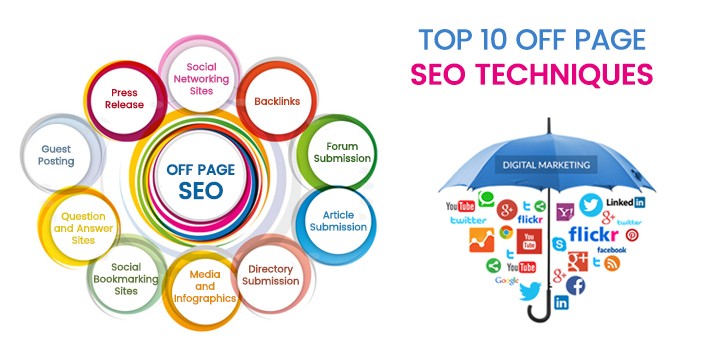- Chennai, TN, India.
- +91 96263 11523
- +91 97908 61925
Off - Page SEO

According to a study, Off-Page SEO-related factors could potentially carry a ranking factor which weighs more than 50%. You might have heard of the term Off-Page SEO before, but do you know what it really means?
Like all SEO terms, it’s a set of techniques that marketers implement to drive more users to a website by increasing its rank on the search engine results page. Unlike On-Page SEO, which is carried out within the website, Off-Page SEO includes everything that’s implemented outside the website.
There are four Off-Page SEO factors that you need to consider: site traffic, relevance, domain authority, and link type.
First, we need to talk about site traffic.
The entire purpose of implementing an Off-Page SEO strategy is to bring more organic search traffic to your website. So when you’re planning your Off-page SEO strategy, it’s essential to evaluate how much traffic a particular activity can potentially bring to your website.
Backlinking still lies at the centre of Off-Page SEO. Search engines use these links to determine the quality of a website’s content. So, if your website has a significant number of high-value backlinks, it will most likely outrank competitors. However, some of these tactics can be considered black-hat SEO. So please refrain from overdoing them.
Second, we need to look at the domain authority.
This is the score that depicts the performance of a website. Basically, if a website is performing well, Google will value their opinion higher and trust the websites that they link to. When performing off-page activities, you’ll need to know the quality of the website that you’re planning to use. If your website has a lower domain authority and you place your backlink on a website with a higher domain authority, they can essentially pass some of that authority to you and allow you to rank higher.
The third thing you need to consider is relevance.
You always need to optimise your content for the end user. The days of keyword stuffing are outdated. Additionally, you need to keep the promotional content to a minimum and include more valuable content. Make sure to do proper research before writing and collect valuable data that you can integrate into your content where possible.
For instance, if your business deals with makeup products and you choose a host website with a high domain authority but they talk about technology, it’s definitely not going to work for you. So make sure you’re looking for links that actually relate to your company.
And finally, the fourth factor to consider is link type.
When considering Off-Page SEO activity, you need to decide which type of link you should use. These can be broken down into do-follow and no-follow links. A “Do-follow” link is an inbound link type that enables Google bots to pass link values, sometimes called “link juice,” from one website to another. If you want to receive the best boost from a do-follow link, it’s recommended that the blog post use a relevant keyword as the anchor text to link to the target website.
You should encourage other sites to diversify the anchor text that they use when linking. Try to get them to use a variety of keyword phrases so they won’t be seen as inorganic by Google.
Having the same anchor text for all of your posts will indicate that the links may be inorganic or manipulative, and this can lead to penalties. Google keeps track of the number of do-follow links that go to your website and the number of different domains you receive these links from. More do-follow links from more relevant domains will provide you with more link juice and give you a higher ranking in search engine results.
And the “No-Follow” link, on the other hand, does not allow the Google bots to follow them, so they don’t offer any link juice or value to the page that’s being linked. Because of this, no-follow links won’t have any impact on the rankings of the linked website. You probably shouldn’t go seeking this type out, but they can still drive organic traffic to your website by people clicking on them, so there’s no need to get angry if they do happen organically.
Now that we know the four main elements to consider in your Off-Page SEO strategy, it might be worth taking a step back and considering why Off-Page SEO is important. Basically, Google gets to know more about the level of traffic to your website and where that traffic is coming from. From Off-Page SEO than anything, you could do. There are endless reasons to implement an Off-Page strategy.
About Us
Navigate
Help & Support
© 2025 MadwithPPC. Created with ❤ using WordPress and Kubio
